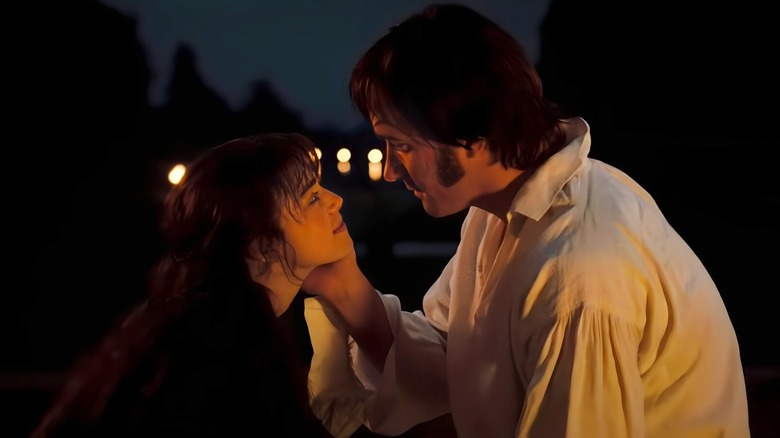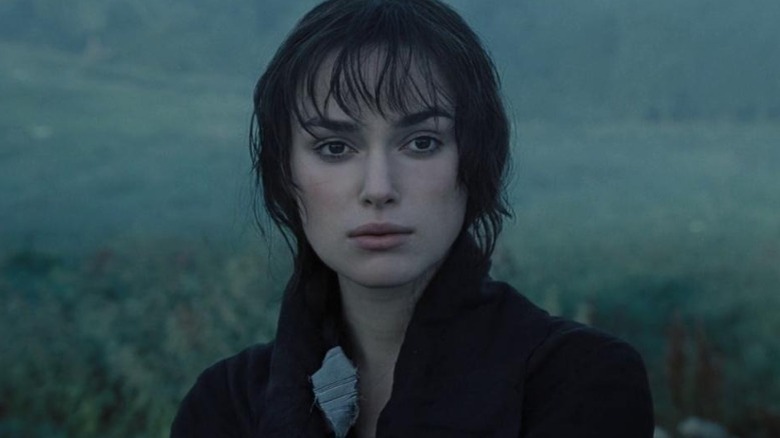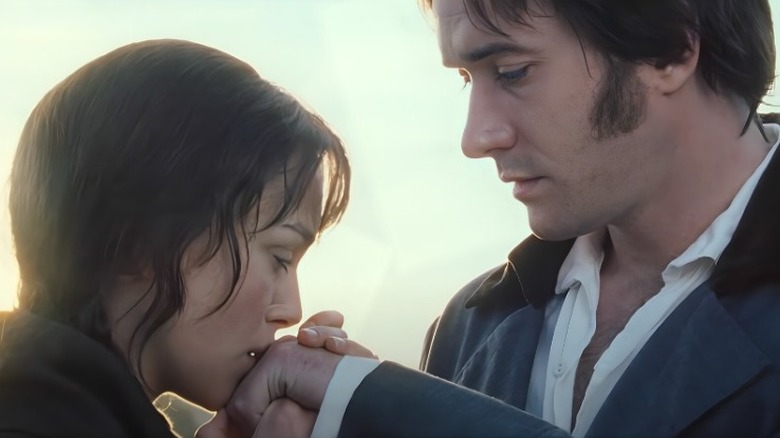Pride & Prejudice: Why UK Viewers Called The US Ending 'Sexed-Up' And 'Blasphemous'
The architect of the perfect marriage plot, Jane Austen has held a place in lit classes and hearts all over the world. So prolific and beloved is her work that her six major novels are frequent choices for adaptation.
The writer's famed magnum opus, "Pride & Prejudice," is the one she is most known for, and subsequently comes with a lot of discourse. Fans will continue to debate the merits of the BBC miniseries and Joe Wright's 2005 film until the end of time. But while both accomplish different hallmarks of Austen's works, there is one black mark against the feature film that English audiences cannot forgive.
At first glance, the early aughts' "Pride & Prejudice" has everything going for it. Starring Keira Knightley as the witty Lizzy Bennet, the film contains picturesque sweeping shots and dramatic professions of love in the rain. And though there is no contesting the beauty of the cinematography, the glossy veneer of the film is also a double-edged sword. Many film elements have a sense of Hollywood glamor, including the controversial ending that was not in the book.
The original ending of Wright's "Pride & Prejudice" contains a romantic scene of Lizzy and Mr. Darcy (Matthew Mcfadyen) in a steamy lip-lock, arousing a rom-com atmosphere. While US audiences had no problems with this romantic ending, many critics across the pond felt that this conclusion disrespected the source material.
Is Pride & Prejudice just another rom-com?
Upon the release of "Pride & Prejudice," Austen experts were quick to disavow Joe Wright's film. While the project sticks close to the literal events of the novel, many felt as though all nuance was lost. As the former head of the Jane Austen Society of North America, Elsa Solender told the New York Times that the scene: "insults the audience with its banality."
Solender's implication seems to be that rom-coms are too formulaic, a common criticism of the genre. The added scene may also have been shocking to Austen academics purely because of the social norms of England at the time. Nowhere in "Pride & Prejudice," or any of her other works for that matter, are there overtly sexual scenes. Even seeing the two characters kiss could be uncomfortable for those familiar with her work.
English Professor Joan Klingel Ray, who teaches at the University of Colorado at Colorado Springs, put a finer point on it, stating in the NYT article: "One of Jane Austen's greatest talents is that she presents sexual tension with such subtlety." These comments became so prevalent that Wright ultimately decided to split the difference between the UK and US audiences. In the UK version, the film ends with Lizzy telling Mr. Bennet (Donald Sutherland) about her intention to marry Darcy. This is more of a faithful ending to Austen purists. But for US audiences, Wright kept the original, stating: "I guess, in America, you just like a little more sugar in your champagne."
There's nothing wrong with a love letter to Austen
There is no wrong way to consume media, and academics are within their right to feel betrayed about an ending they don't have to watch if they don't want to. But accusing "Pride & Prejudice" of lacking subtlety isn't exactly accurate.
One of the most sexually charged moments of the film is when Darcy helps Lizzy into a carriage by touching her bare hand, an intense form of intimacy at the time. With no expository dialogue, you see by Darcy and Lizzy's reaction how significant the simple act is. The film fully invests in these moments and stays true to the spirit of Jane Austen's work.
The visuals may be bright and shining, and the actors a little too beautiful for how they are described, but Joe Wright finds a happy medium of an authentic adaptation and a dazzling film. There needs to be some bridge between the audience that the book was originally written for and contemporary audiences; Wright accomplishes this. And perhaps it is not a straight adaptation, but it is a love letter to Austen's work.
So if filmmakers present these ideals and themes in an attractive package for lovers of the genre to enjoy, there can't be anything wrong with that. Movies like these often drive fans to explore the source material, and that is the most important thing.


